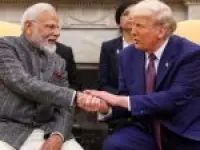
The question of whether the petrodollar deal between Saudi Arabia and US has expired, and the Kingdom’s refusal to renew the deal, has been looming large for past few days. While some report claims the deal to expire, others called it fake.
Some reports also claim that there is no such deal, even though Saudi made most of its oil deal in dollars.
Reportedly, the news first came through a Chinese-language social media posts in June, claiming that Riyadh has ended a 50-year long formal agreement with Washington to conduct oil transactions through dollars, and the deal was called as “petrodollar agreement”.
US-Saudi Petrodollar Deal: Here is what we know
What is petrodollar?
The term petrodollar is used with three distinct meaning, which are often confused with each other.
The term was coined in 1970s. It is used to refer to dollars paid to oil-producing nations – surpluses of oil-producing nations. The term is also used to refer to the currencies of oil-producing nations which tend to raise in value against other currencies when the price of oil rises (and fall when it falls).
The third usage of the term is what is on the table now – the pricing of oil in US dollars, which mean, currencies used as a unit of account to price oil in the international market.
What is the petrodollar system?
As per media reports, the petrodollar system came as a result of the Washington going off the gold standard. Until 1971, US has tied its currency to the price of gold at $35 per ounce under the Bretton Woods System – a system of monetary management which established the rules of commercial relations among 44 countries, including the United States.
Reportedly, then US president Richard M Nixon terminated the agreement in 1971. This was when the US dollar collapsed after the global economy and its demand for safe assets exceeded the available supply of gold bullion.
The Petrodollar system was set up in 1972. As the global supply of dollars increased, oil exporters earned more and more petrodollars thanks to higher oil prices.
The said deal between Saudi Arabia and US
Reportedly, the deal between the two countries was reached in 1974, when US was hit with oil crisis. As per Bloomberg, the crisis hit US badly, and prices sky rocketed, after the Arab nation in the OPEC (Organization of the Petroleum Countries) issued sanctions on US, for helping Israel in its Yom Kippur war (the fourth Arab-Israel war led by Egypt and Syria against Israel).
Read also: All You Need To Know About Saudi’s ‘Departure’ From Petro-Dollar Deal And Its Implications For US
As per the deal, the US would buy oil from the Kingdom and provide it with military aid and equipment. At the same time, the Saudi would send billions of their petrodollar revenue back into America and finance its spending.
However, there are no official record of the deal. Though Riyadh still exclusively sell oil in US dollars, there was no formal deal or agreement.
What is the recent buzz
According to a media report, the first claim about the end of the said deal came on Chinese social media platform Weibo, on June 15, 2024. “The Petrodollar Agreement between the United States and Saudi Arabia expired and Saudi Arabia announced on June 9 that it would not renew it. The agreement, reached in 1974, closely linked the U.S. dollar to oil”, claim the report, as quoted by media.
The Chinese platform cited the United States-Saudi Arabian Joint Commission on Economic Cooperation, as evidence of the formal agreement between the two countries to sell oil in dollars. The commission was formed in June 1974 and expired on June 9, 2024.
To use US dollar for oil exchange was a secret and informal deal between the two countries, as per Bloomberg reported in 2016.
Read also: Saudi Arabia And China Sign Approved Destination Status Agreement
According to an academic paper published on Journal of Global Faultlines, regarding the U.S. oil hegemony, the unofficial agreement between the two countries allowed the dollar to become the standard international oil reserve currency, placing the U.S. in an extremely powerful position as nations continued to rely more and more on oil in the decades following the deal.
Saudi Arabia’s drifting away from US
Though there was no formal deal, Riyadh has been doing oil transaction with US dollars as the base currency. According to public records, there is no recorded instances of other currencies being used for any transactions.
However, the speculations of Saudi planning to begin its oil trades in other currencies cannot be ruled out completely. According to Paul Donovan, chief economist of Global Wealth Management at global financial firm UBS, Saudi has indicated in 2023 that it would be “happy to conduct” oil transactions in non-dollar currencies. In the same year, Wall Street Journal also reported that 20% of the world’s total oil trade that year was not denominated in dollars and that Saudi Arabia had “recently taken steps laying the groundwork for trade that sidesteps the dollar”.
It is true that Saudi is progressively stepping back from its dependence on US. Riyadh’s recent admittance to the expanded BRICS block can be taken as a visible example of it greater slant towards settling oil transactions in currencies other than US dollar. The Increased alliances of US and other Western European countries, and Saudi’s own efforts to lean back from depending upon energy exports, the country has been bolstering its diplomatic and economic engagements with China, Iran, Russia, nations considered primary US foreign policy adversaries. Riyadh’s recent readiness to accept non-dollar currencies reflects broader geopolitical shifts away from US currency hegemony.
The report of expired petrodollar deal is believed to have sprouted from crypto world. Reportedly, several crypto speculators desperately want to believe in the dollar’s demise.
(With inputs from agencies)











